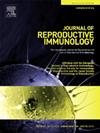Endometriosis: A new perspective on epigenetics and oxidative stress
IF 2.9
3区 医学
Q3 IMMUNOLOGY
引用次数: 0
Abstract
As a complex chronic gynecological disorder characterized by multifaceted etiology involving genetics, environment, immunity and inflammation, endometriosis (EM) has long been a significant concern for women of reproductive age worldwide. This review aimed to comprehensively examine the interplay between epigenetics and oxidative stress (OS) in the pathogenesis of EM. Through the integration of cutting-edge research, the response of OS signals to epigenetic modifications was explored. The microbiome exerts an influence on this causal regulatory relationship, and these mechanisms collectively contribute to the pathophysiology of EM. Specifically, this article highlighted the roles of epigenetics and OS in EM and underscored the importance of the microbiome as a regulatory link. A discussion was also held on the future directions of biomarkers and precision medicine, including the application prospects of epigenetic and OS markers in the diagnosis and treatment decision-making of EM, and innovations in therapeutic strategies like targeting epigenetic modifications and antioxidant therapies. Moreover, this review emphasized the potential of multi-omics integrated analysis to deepen the understanding of the disease, guide future therapeutic strategies and promote personalized medicine.
子宫内膜异位症:表观遗传学和氧化应激的新视角
子宫内膜异位症(endometriosis, EM)是一种复杂的慢性妇科疾病,其病因涉及遗传、环境、免疫和炎症等多方面因素,长期以来一直受到全世界育龄妇女的关注。本文旨在全面探讨表观遗传学与氧化应激(OS)在EM发病机制中的相互作用。通过整合前沿研究,探讨氧化应激信号对表观遗传修饰的响应。微生物组对这种因果调控关系产生影响,这些机制共同促成EM的病理生理。具体而言,本文强调了表观遗传学和OS在EM中的作用,并强调了微生物组作为调控环节的重要性。讨论了生物标志物和精准医学的未来发展方向,包括表观遗传和OS标记在EM诊断和治疗决策中的应用前景,以及靶向表观遗传修饰和抗氧化治疗等治疗策略的创新。此外,本综述强调了多组学综合分析在加深对疾病的理解,指导未来的治疗策略和促进个性化医疗方面的潜力。
本文章由计算机程序翻译,如有差异,请以英文原文为准。
求助全文
约1分钟内获得全文
求助全文
来源期刊
CiteScore
6.30
自引率
5.90%
发文量
162
审稿时长
10.6 weeks
期刊介绍:
Affiliated with the European Society of Reproductive Immunology and with the International Society for Immunology of Reproduction
The aim of the Journal of Reproductive Immunology is to provide the critical forum for the dissemination of results from high quality research in all aspects of experimental, animal and clinical reproductive immunobiology.
This encompasses normal and pathological processes of:
* Male and Female Reproductive Tracts
* Gametogenesis and Embryogenesis
* Implantation and Placental Development
* Gestation and Parturition
* Mammary Gland and Lactation.

 求助内容:
求助内容: 应助结果提醒方式:
应助结果提醒方式:


